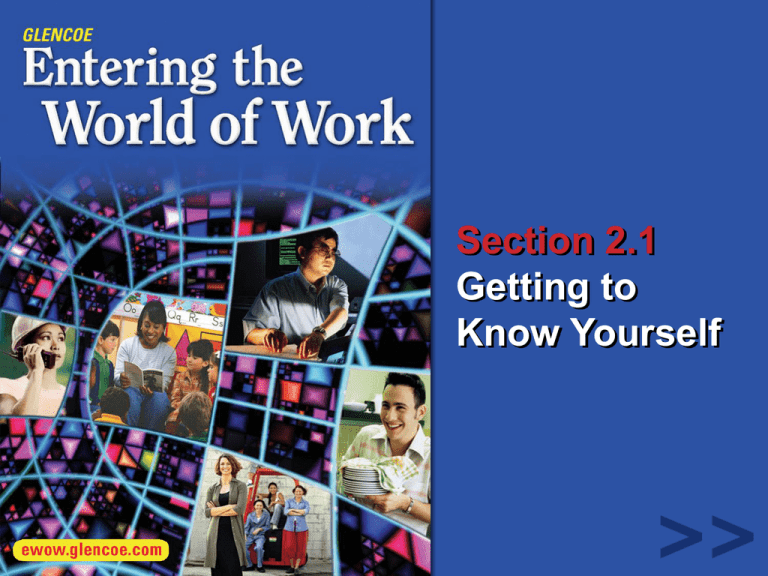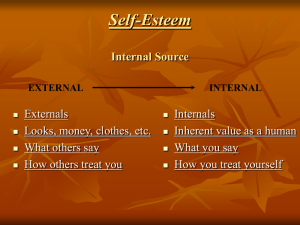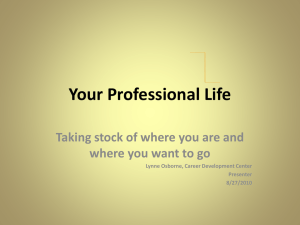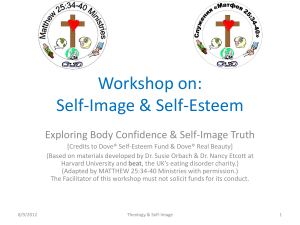Section 2.1 Getting to Know Yourself
advertisement

Section 2.1 Getting to Know Yourself Getting to Know Yourself Section 2.1 Main Idea You need to know yourself to choose the right career. You need to know your values, interests, skills, and talents. 2 Getting to Know Yourself Section 2.1 Key Terms self-awareness values interests experiences volunteer work skills knowledge talents 3 Getting to Know Yourself Section 2.1 Self-Awareness Means Knowing Yourself self-awareness Self-awareness is about knowing yourself. Knowing your thoughts, feelings, and actions. When you know yourself, you can make good choices. 4 Getting to Know Yourself Section 2.1 Self-Awareness Means Knowing Yourself To be self-aware, you need to know: Your values Your interests Your skills Your talents 5 Getting to Know Yourself Section 2.1 Your Values Are What is Important to You values You can become more self-aware by thinking about your values. Things that are important to you. You want to make a good match between your values and your career. 6 Getting to Know Yourself Section 2.1 Your Values Are What is Important to You Which values are most important to you? helping other people being part of a family earning a lot of money having good health being a spiritual or religious person 7 Getting to Know Yourself Section 2.1 Your Values Are What is Important to You When you live by your values, you can be proud of your life. Most happy people take pride in their work and live by their values. 8 Getting to Know Yourself Section 2.1 Your Interests are the Things You Like to Do interests Understanding your interests is another part of understanding yourself. Things you like to do. Knowing your interests will help you choose a career and plan your life. 9 Getting to Know Yourself Section 2.1 Your Interests are the Things You Like to Do You can figure out your interests by thinking about your experiences at school, home, work, and in the community. experiences Activities you have tried. How you spend your leisure time is another clue to your interests. 10 Getting to Know Yourself Section 2.1 Your Interests are the Things You Like to Do volunteer work Volunteer work is helpful work experience. Work you do without receiving pay. Imagine that you volunteer at your local library. You will find out if you would enjoy working there full time. 11 Getting to Know Yourself Section 2.1 Your Interests are the Things You Like to Do You can learn about your interests and identify jobs that are right for you by taking an interest survey. An interest survey is a list of questions about your likes and dislikes. 12 Getting to Know Yourself Section 2.1 Your Skills are Your Specific Abilities skills Skills are things you know how to do. Abilities to do specific tasks. Taking care of children is a skill. Operating a wheelchair is a skill. 13 Getting to Know Yourself Section 2.1 Your Skills are Your Specific Abilities There are two types of skills: Job-specific skills are abilities you need to do a specific job, like using a table saw. Transferable skills are general abilities, like reading and writing, and personal qualities, like responsibility and honesty. 14 Getting to Know Yourself Section 2.1 Your Skills are Your Specific Abilities knowledge When you put knowledge and practice together, you get a skill. Understanding facts. To improve a skill, you need to learn more and practice more. Practice means repeating something again and again. 15 Getting to Know Yourself Section 2.1 Your Talents are Your Natural Gifts talents A talent is the ability to do something easily or to learn something easily. Natural gifts. You will be happier if you choose a career that lets you use your special talents. 16 Getting to Know Yourself Section 2.1 Your Talents are Your Natural Gifts Three Types of Talents Mental Talents Talents that involve thinking and creativity. Physical Talents Talents that involve using your body. Social Talents Talents that involve getting along with other people. 17 Section 2.2 Being an Individual Being an Individual Section 2.2 Main Idea Everyone is different. Your personality and self-image make you an individual. 19 Being an Individual Section 2.2 Key Terms personality learning styles self-image self-esteem 20 Being an Individual Section 2.2 Your Personality is How You Think, Feel, and Act personality Your personality is an important part of who you are. The way you think, feel, and act. 21 Being an Individual Section 2.2 Your Personality is How You Think, Feel, and Act Understanding your personality will help you pick a career you will like. Your personality can make you well suited for certain types of work. 22 Being an Individual Section 2.2 Your Personality is How You Think, Feel, and Act learning styles When you know your learning style, you can figure out the best way to learn something new. The different ways people naturally think and learn. There are eight different learning styles. 23 Being an Individual Section 2.2 Your Personality is How You Think, Feel, and Act The Eight Learning Styles Verbal-linguistic learners Logical-mathematical learners Visual-spatial learners Musical-rhythmic learners Bodily-kinesthetic learners are good with words. are good with numbers. are good at imagining things. have musical talent. like to touch things and move around. Interpersonal learners are good with people. Intrapersonal learners are usually very self-aware and confident. Naturalistic learners enjoy nature. 24 Being an Individual Section 2.2 Your Self-Image is How You See Yourself self-image Another part of you is your self-image. How you see yourself. Your self-image is how you picture yourself in your mind. 25 Being an Individual Section 2.2 Your Self-Image is How You See Yourself When you have a positive self-image: you feel good about yourself. you can picture yourself achieving what you want in life. 26 Being an Individual Section 2.2 Your Self-Image is How You See Yourself self-esteem When you see yourself in your mind, do you like what you see? A positive feeling about yourself. If so, you probably have high self-esteem. 27 Being an Individual Section 2.2 Your Self-Image is How You See Yourself Advantages of Self-Esteem It helps you feel confident. It helps you try new things. It helps you learn. It helps you get along with other people. It helps you succeed at school and on the job. 28 Being an Individual Section 2.2 Speaking of Empathy To communicate well, it is important to use empathy. Empathy is caring about the feelings, thoughts, and experiences of others. Use empathy when you talk and when you listen. If someone makes you upset, stay calm and ask what the person meant to say. Communicating with empathy is very important on the job. It helps you get along with customers, coworkers, and supervisors. 29 Understanding Yourself Chapter 2 Review 1. Explain why you need self-awareness to set career goals. You need to self-awareness to set career goals because self-awareness helps you decide which career area best fits your values, interests, talents, and personality. 30 Understanding Yourself Chapter 2 Review 2. Tell why it is important to know your values. It is important to know your values because values are the basis of the choices you make. Values help you do what you think is right. 31 Understanding Yourself Chapter 2 Review 3. List three ways to identify your interests and talents. Three ways to identify your interests and talents include: trying a wide range of activities; taking an interest or aptitude survey; and paying attention to what other people say you do well. 32 Understanding Yourself Chapter 2 Review 4. Explain why you should consider your personality and learning styles when choosing a career. You should consider your personality and learning styles when choosing a career because this will help you find a job that is a good match and that you will be happy doing. 33 Understanding Yourself Chapter 2 Review 5. Describe why it is important to have a positive self-image. It is important to have a positive self-image because this helps you feel good about yourself and try new things. 34 End of Chapter 2 Understanding Yourself








